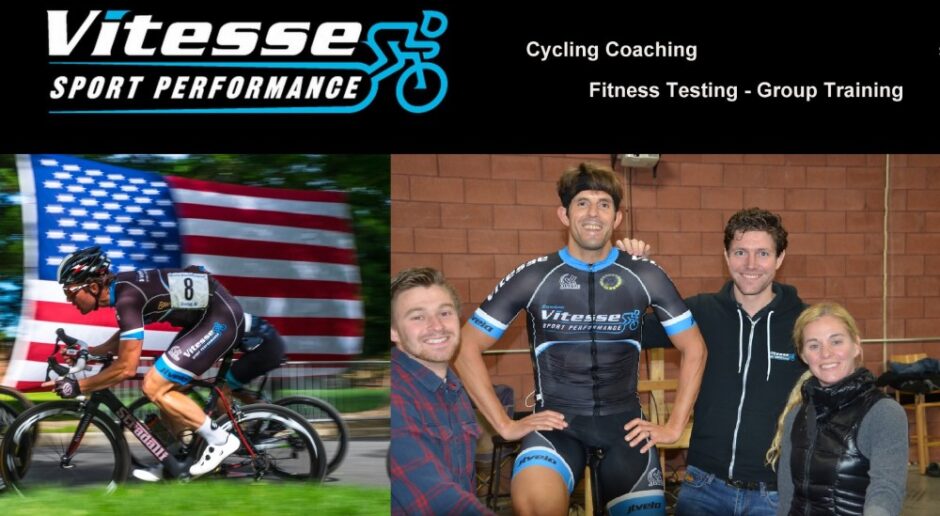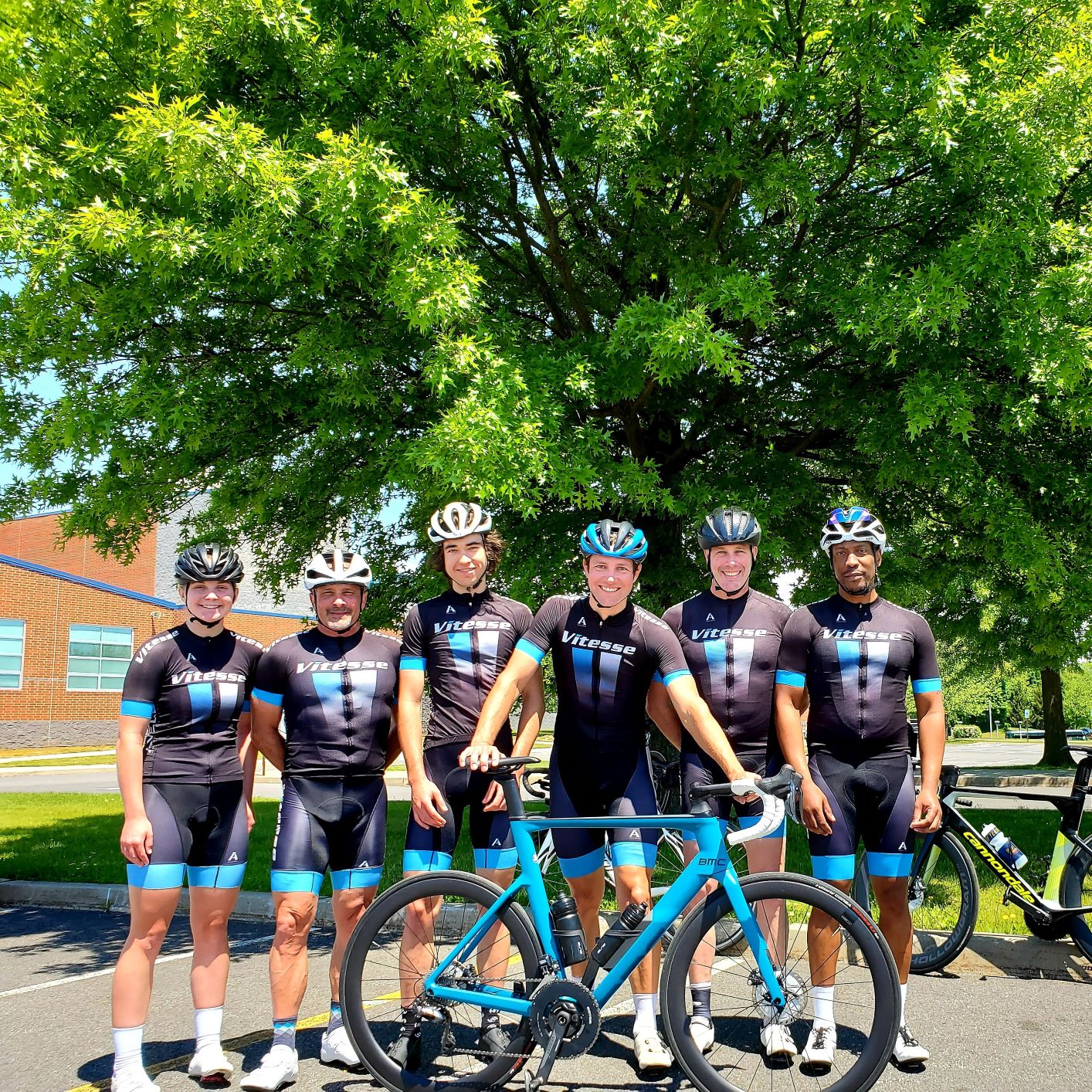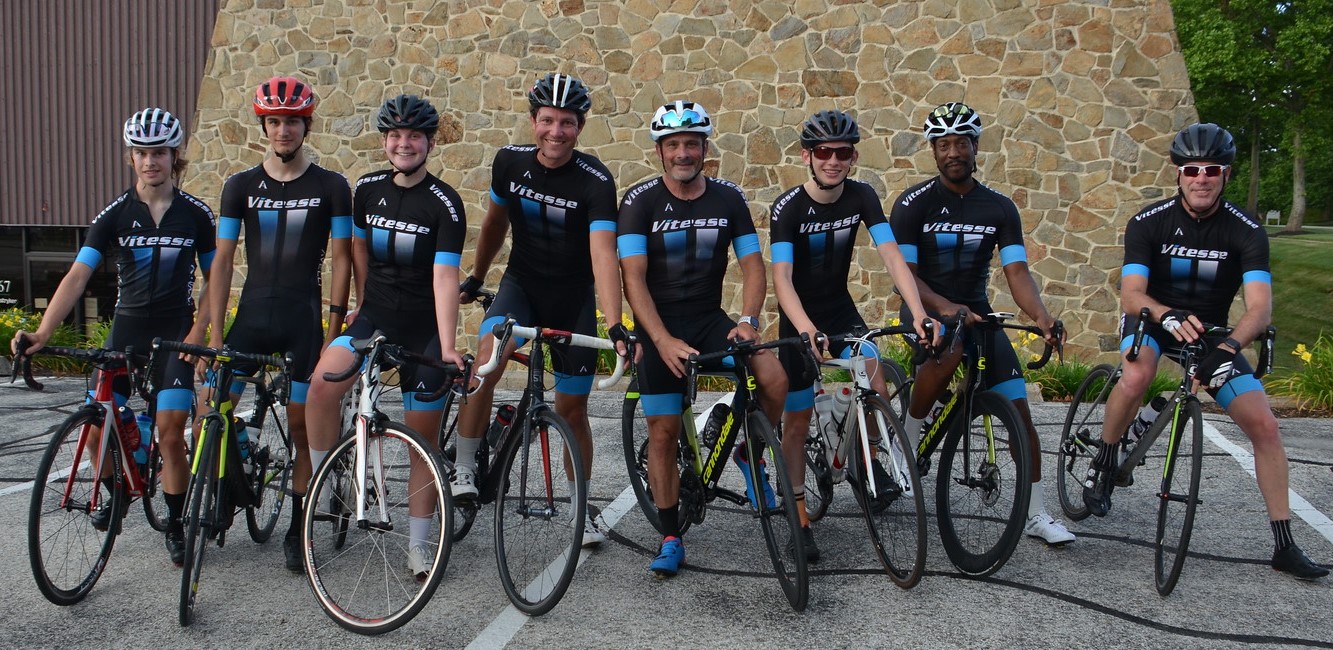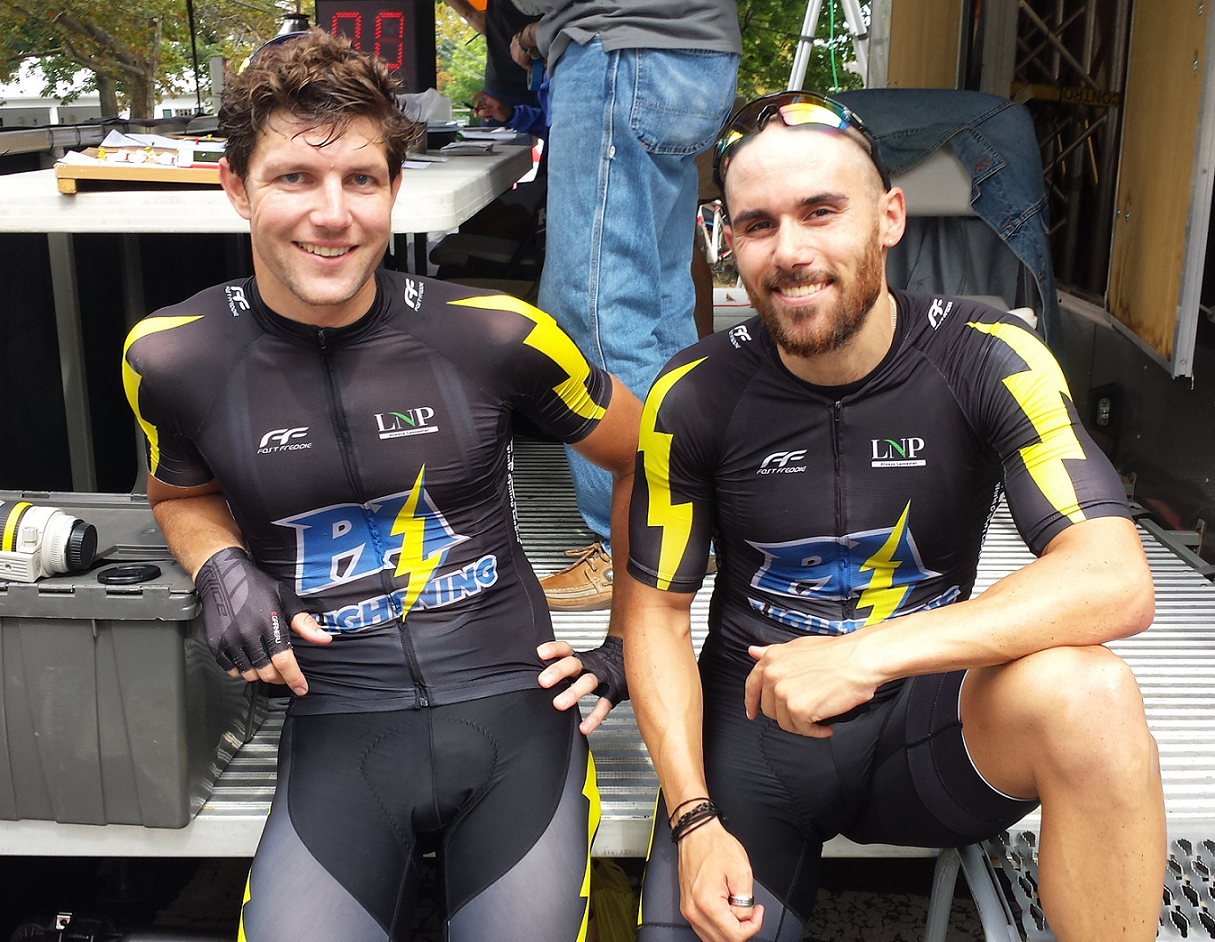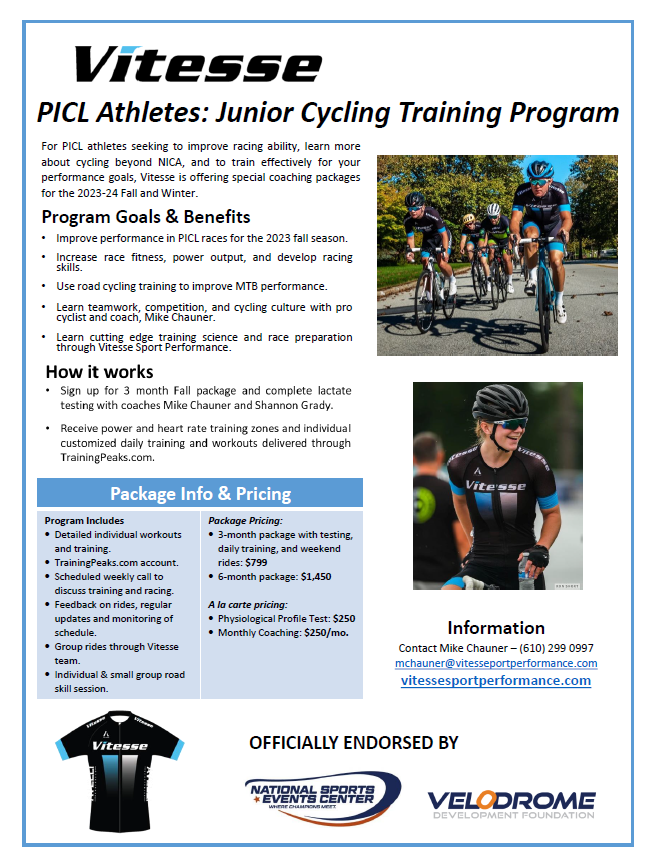
Fall/Winter 2023 – 2024 Junior Cycling Coaching Programs now available

2023 Coaching Programs Now Available
Accepting new athletes now!
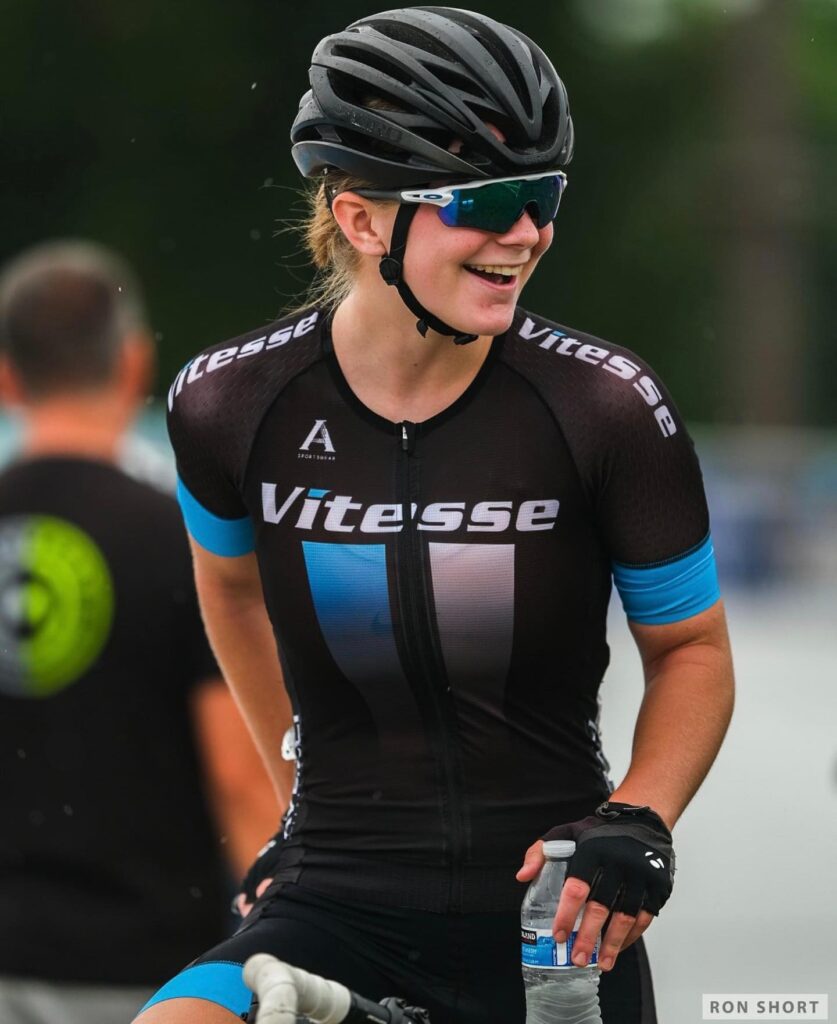
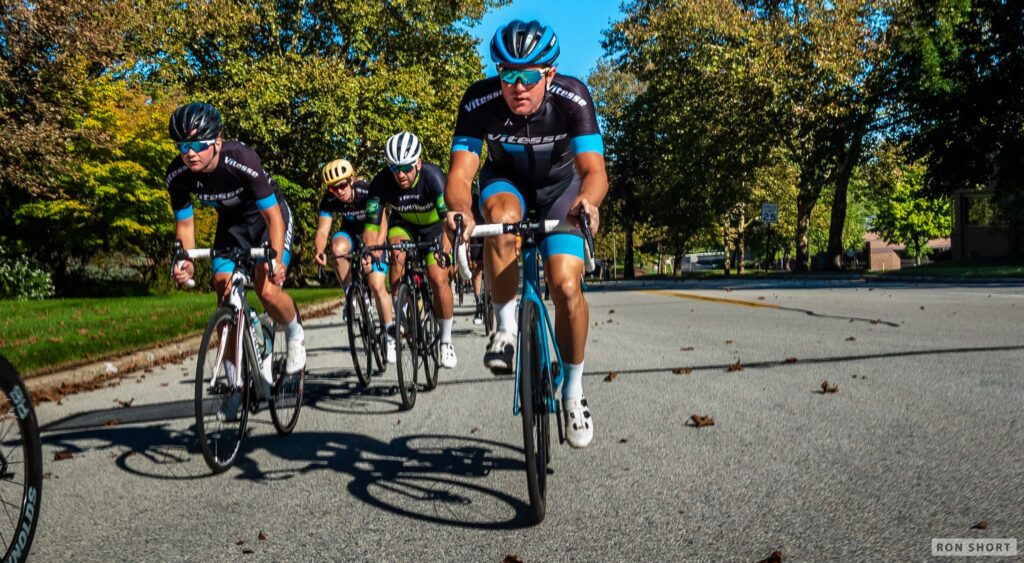
Fall/Winter 2022 – 2023 coaching programs are open to athletes of any age or discipline within cycling. Whether you are training for road, MTB, cross, or triathlon, the fall and winter months are critical for making major improvements leading into the spring and summer racing seasons.
Talk to Coach Mike about arranging a consultation and book Lactate Testing to receive your full physiological profile. We will use the test data to create a fully customized training plan to meet your performance goals.
Schedule consultation with Mike by phone or email:
(610) 299 0997
mchauner@vitessesportperformance.com
Vitesse Team Now Competing in 2021 Racing Season
With six wins for Vitesse athletes in the first half of the 2021 season, racing is off to a successful start for our young program.
The Vitesse team now has upwards of 20 members with athletes ranging from 17 to 55 years old. Our junior/U23 division has also grown to include 8 riders under the age of 21.
Follow us here and on our social media pages for the latest on our season!
Team Vitesse
The Vitesse team is comprised of motivated athletes who seek to better their cycling skill, experience, and performance. We are open to willing cyclists of any discipline who wish to participate in organized group rides and practices, training programs, racing, and social outings with similarly motivated individuals!
No prerequisites to join. Simply get in touch the team coach, Mike Chauner: mchauner@vitessesportperformance.com
Fan or member? View our clothing store here: Vitesse Team Store
Dynamic Duo Forges Coaching Alliance
Michael Chauner of Vitesse Sport Performance and Australian pro cyclist Stephen Hall announce joint coaching programs.
Michael Chauner of Vitesse Sport Performance and his longtime teammate and illustrious Australian pro cyclist, Stephen Hall, have formed an alliance to run joint coaching programs for American cyclists. The announcement comes as Vitesse moves into its eighth year while Chauner continues to build upon the recent addition of the Young Medalists Junior Cycling Team based in the Lehigh Valley. Hall is currently finishing a B.Sc. in Exercise Sport Science from Edith Cowan University in Western Australia and plans to be in the Unites States for the 2020 season.
New programs will include coaching led by Chauner and Hall in both track and road disciplines. They will focus on Master and amateur cyclists of all levels, and will continue to build the Young Medalist team into the top junior racing program of the region.
Their approach embraces a strong balance between science and art, using cutting edge technology and objective data for training analytics while stressing the importance of time-tested technique, race strategy, and the mental side of being a top performing athlete.
The future will cover all elements of becoming a better bike rider. Vitesse has been working closely with Exercise Scientist and former pro triathlete, Shannon Grady of Go! Athletics (http://www.systembasedtraining.com/about-us/), using her powerful diagnostic called Physiological Profile Testing, an advanced form of lactate threshold testing used on thousands of athletes for over 20 years.
Collecting important physiological data has greatly improved the Vitesse approach by pinpointing athletes’ exact areas of strength and weakness and using that to fine tune the technical component of their training. Every new Vitesse athlete will run through this form of testing.
Growing up with the simultaneous embrace of road and track racing, Hall and Chauner come from similar schools of thought on the teaching of race and group tactics in addition to simply analyzing data. “I don’t know many coaches on the market who  specifically teach the art of racing alongside looking through power files,” says Hall, “and Mike’s existing outdoor clinics for his athletes and practices for juniors are a main focus for us to greatly expand upon in the future. Coaches should be able to blend athletes’ physical data with what they see with their own eyes out there on the road. Our new track sessions are also going to be a good example of that.”
specifically teach the art of racing alongside looking through power files,” says Hall, “and Mike’s existing outdoor clinics for his athletes and practices for juniors are a main focus for us to greatly expand upon in the future. Coaches should be able to blend athletes’ physical data with what they see with their own eyes out there on the road. Our new track sessions are also going to be a good example of that.”
More detailed info on coaching programs can be found here: http://vitessesportperformance.com/wordpresscoaching-services-2/overview-philosophy/
FTP Testing Vs. Physiological Profile Testing
What type of fitness testing works best: FTP or LT testing? Or is more info needed?
Shannon Grady of Go Athletics responds:
Cyclists / triathletes ask me this question often. The two metrics are comparable to one another but also comparably deficient, and thus ineffective training indicators. Neither FTP nor Lactate Threshold testing tells you the “what”, “why”, or “how.” In other words, “what” type of energy an athlete has available to perform work/training/racing; “why” the athlete may or may not be improving his/her FTP, LT, or performances; and “how” to the athlete should steer his/her training to improve physiology for better performances.
FTP is an arbitrary metric, and serves as a proxy for only one type of effort. Using % of FTP values as a benchmark for training will, as a result, over work some and under work others. “Lactate threshold” (LT) values can be similar to an FTP value, but similar to FTP, it is a one-dimensional view of performance. Comprehensive blood testing (of which lactate threshold is a component) opens the doors to dynamic analysis on how all energy systems are performing (not just one energy system like FTP/LT), each of which are critically important in determining successful performance. Looking at either FTP or LT in a silo will give you a misinformed view of the truth.
Instead, I use (and recommend you use) a physiological profile test (PPT), which uses lactate but is not a lactate threshold test. This kind of test gives a more complete picture of the entire energy spectrum, and enables coaches and athletes to understand the “what,” “why,” and “how.” As a result, the coach or athlete can have more insight into the training stimulus required to improve both the metabolic outputs and performance of each athlete.
Below is an example of two cyclists PPT results (who I recently tested), both of whom have the same FTP values. Despite having the same FTP values, Cyclist #2 is operating off more bioenergetic availability than Cyclist #1.
Even though both have the same FTP value, they arrive at this value using different energy sources. Cyclist #1 will have a negative metabolic response and performance outcome if he trains at the same FTP % values as Cyclist #2 because their actual energy contributions when performing work at the same percentage of FTP are about 25% different. In summary, FTP or LT is too one-dimensional to extrapolate usage across various energy systems because it assumes all athletes have the same functional work capacity. This is not true given that the physiological blueprint for all athletes are extremely unique, and will cause athletes to under-optimize the needed training stimulus. Physiological profile testing will better pinpoint functionality across all energy systems and be specific to each athlete.
Shannon Grady. Physiologist. CEO/Founder Go Athletics. Coach/Consultant to Pros, Olympians, NCAA Champions, HS and Recreational coaches and athletes. 5x TeamUSA member, Ex-Pro Runner, NCAA All-American, now enabling others to achieve their potential.
